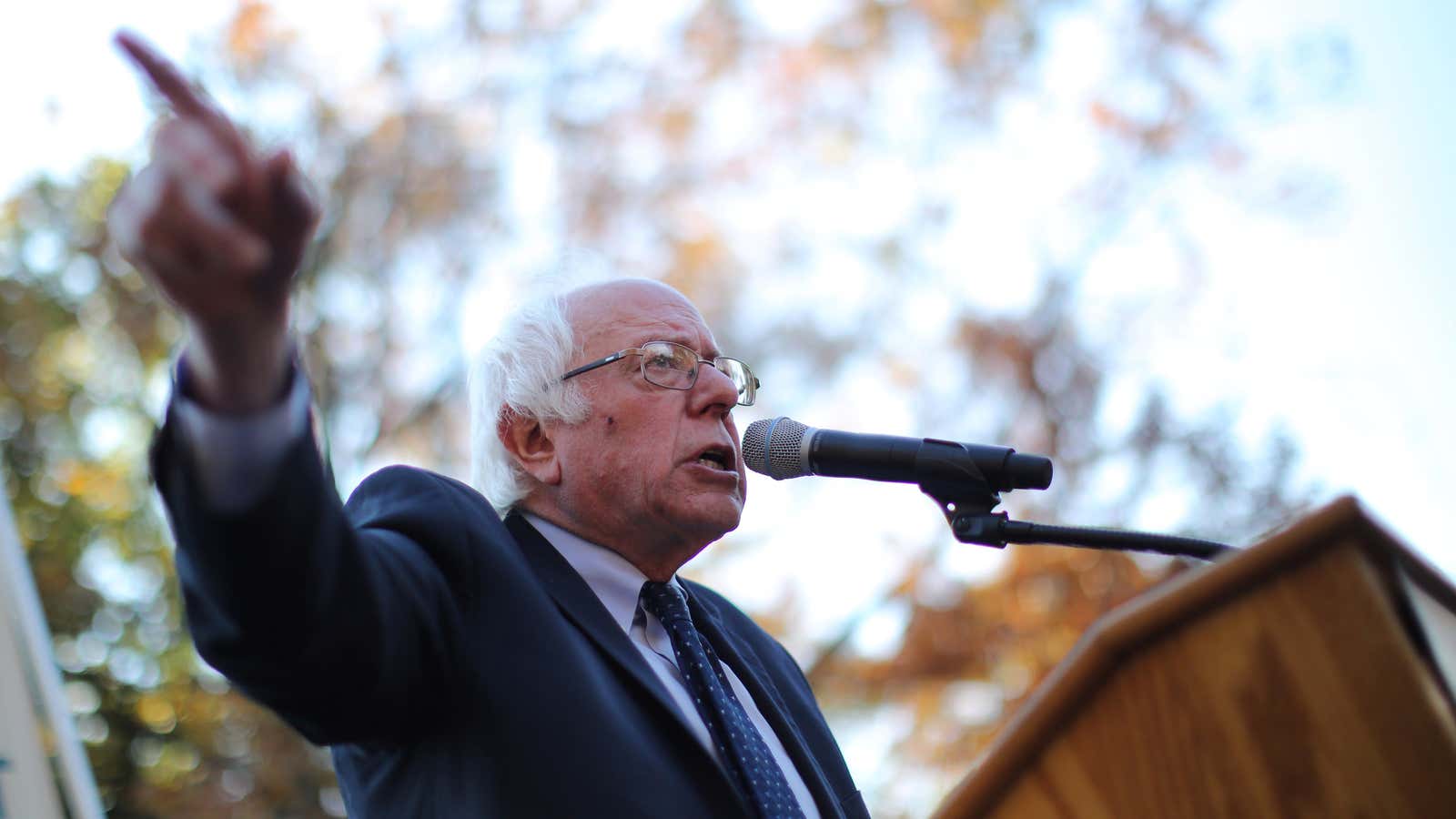At a town hall in Wisconsin this week with MSNBC’s Chris Hayes, Bernie Sanders made a powerful case for why the American dream has been eroded by a wealthy corporate assault on the middle class. In a forum that included both conservative and independent voters, Sanders deftly and empathetically answered concerns about raising the minimum wage and free college tuition. He reminded me, again, why I voted for him.
Unfortunately, he also reminded me why many others didn’t. Early in the evening, Chris Hayes asked Sanders why he thought Donald Trump had been so successful. Sanders responded with a rather confusing endorsement of Trump’s attack on political correctness. “I think he said he will not be politically correct,” Sanders explained. “I think he said some outrageous and painful things, but I think people are tired of the same old politically correct rhetoric, and they believe that he was speaking from his heart and willing to take on everybody.”
Sanders then, and also bizarrely, defined political correctness as a phrase describing political double-speak. “It means you have a set of talking points which have been poll-tested and focus-group-tested and that’s what you say rather than what’s really going on. And often, what you are not allowed to say are things which offend very powerful people.”
Of course, as Chris Hayes and audience members pointed out, this is not at all what political correctness means in general, nor what Trump means by it in particular. The history of the term in the US stretches all the way back to the 18th century. But while president Lyndon Johnson used political correctness as a way to describe a better type of politicking, the term has been used by conservatives since the 1980s and 1990s to suggest that people on the left are totalitarian and intolerant. Opponents of political correctness, such as Trump, present requests for decent treatment of marginalized people as infringing upon free speech.
When Trump boasts about violating political correctness, he’s not talking about truth-telling on trade policy, as Sanders suggests. Rather, he’s signaling an imminent verbal attack on women or Muslims or the disabled. Political correctness, for Trump, is a way to frame bigotry as anti-establishment boldness.
Sanders, who began his career with civil rights advocacy in Chicago during the 1960s, doesn’t want to endorse bigotry. But he does want to endorse Trump’s campaign theme of opposition to political correctness, at least in a limited, convoluted way. Why?
There are a couple of reasons, I think. First, Trump won. When someone wins, you want to figure out how they did it, and identify lessons from their victory, so you can win too.
Second, Trump did very well with the white working class, and many pundits have linked his victory to this demographic especially (though the truth is he did well with all white voters). Sanders also identifies strongly with the white working class. After the election he declared, “I belong to the white working class, and I am deeply humiliated that the Democratic Party can’t talk to the people where I come from.”
Trump’s rejection of political correctness seems to resonate with voters who Sanders sees as particularly important. So Sanders is trying to adopt and rework the rhetoric on political correctness into something he can use—to turn it into an all-purpose attack on elites.
The problem is that it’s not so easy to pull the devil’s tongue out of the devil’s mouth. When Sanders defines political correctness as focus-group-tested political speak, he ends up implicitly suggesting that Trump is fighting the good fight against mealy-mouthed politicians when he boasts about sexually assaulting women, or when he accuses Mexicans of being rapists. Under this logic, if Trump is fighting “elites,” then marginalized people are actually powerful oppressors. That’s a dangerous worldview for Sanders to buy into—just as all the post-election sneering at coastal elites erases, and demonizes, the huge numbers of impoverished, working class and middle class people who also live in California and New York.
Cosigning Trump’s attack on political correctness validates the bigotry of his campaign. It plays into the ongoing effort by people on the center and right to blame Hillary Clinton’s loss on “identity politics” and anti-racist and feminist organizing. At the very least, Sanders’ comments inadvertently provide cover for Trump, glossing over the deliberately poisonous nature of his rhetoric.
Politicians want to do what voters want. Voters elected Trump, and so politicians are looking for ways to adapt Trump’s programs and words for their own purposes. But people with good intentions, like Sanders, need to be very careful when they try to use Trump—lest Trump wind up using them.
